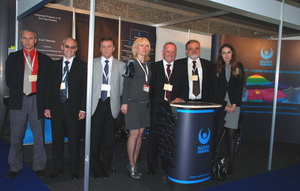
The general global decline in business activity did not affect the level of organization of the conference. We were pleasantly surprised by the diligent, well-coordinated work of all the staff and sponsors.
In difficult times of crisis, professional societies (such as EAGE, SEG, Ukrainian Association of Geologists) are called upon to support members of the global geological community and needing specific help. Opening of the Employment Center at the exhibition in Amsterdam was one of those events. In addition, EAGE has significantly expanded its activities in the framework of the Education Program and increased the financial support of talented students, eloquently demonstrating an understanding of the importance of working with young people.
The mood at the annual EAGE conference in Amsterdam was, surprisingly, optimistic. The participants talked more about how and when the recovery of the oil and gas business would begin, rather than sharing ways of surviving in a recession that also affected the geophysical and engineering sectors.
A relatively pessimistic picture of the consequences of using natural resources was outlined by the representative of UNESCO-IHE Richard Mehank, who devoted his speech to the water problem reaching a planetary scale. The speaker gave shocking statistics on water shortages to meet basic food and hygiene needs in some regions of the world and noted that resource management should be part of the use of world water reserves.
Against the background of a noticeable decline in the use of expensive seismic methods, a significant progress is being made in the so-called direct methods for the search for hydrocarbons, which are favorably distinguished by moderate prices and by the fact that it focuses specifically on the search for hydrocarbons, and not on the study of side effects and related phenomena.